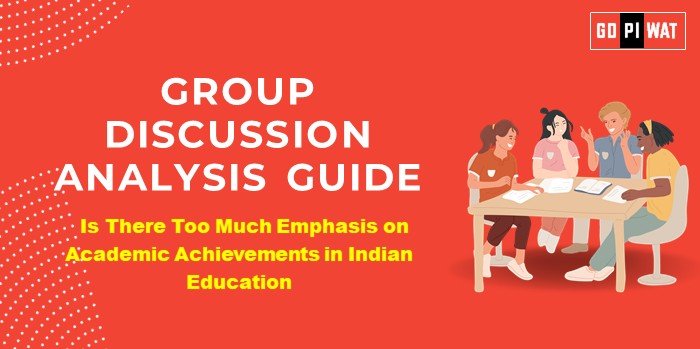📋 Group Discussion Analysis Guide: Is There Too Much Emphasis on Academic Achievements in Indian Education?
🌟 Introduction to the Topic
In India, academic achievements are often seen as the ultimate measure of success, overshadowing holistic development. This traditional emphasis raises concerns about mental health, skill development, and career readiness. Addressing this issue is essential for creating an education system that balances academic rigor with practical skills and personal growth.
📊 Quick Facts and Key Statistics
- 📉 Dropout Rates: ~17% dropout rate after secondary education, partly due to academic pressure.
- 😟 Mental Health Impact: Over 40% of Indian students report experiencing stress due to exam-centric pressure.
- ⚙️ Skill Gap: 50%+ graduates lack industry-required skills, affecting their employability (FICCI, 2023).
- 🌍 Global Ranking: India ranks 62nd in education quality (World Economic Forum, 2023).
🧩 Stakeholders and Their Roles
- 🏛️ Government Agencies: Develop policies prioritizing standardized exams and grades.
- 🏫 Schools and Teachers: Focus on syllabus completion and exam preparation under systemic pressure.
- 👨👩👧👦 Parents: Socioeconomic realities drive parents to prioritize academic success over skill-building.
- 🎓 Students: Bear the brunt of academic stress, with limited exposure to holistic growth opportunities.
- 🏢 Employers: Highlight the skills gap and advocate for practical education.
🏆 Achievements and Challenges
✅ Achievements
- 📚 Improved Literacy Rates: Academic emphasis has significantly contributed to India’s rising literacy levels.
- 🎓 Global Competitiveness: Indian students excel in STEM fields, enhancing India’s global academic standing.
- 🏫 Higher Education Access: Strong academic performance provides pathways to top-tier institutions like IITs and IIMs.
⚠️ Challenges
- 😟 Mental Health Concerns: Academic pressure contributes to stress, anxiety, and student burnout.
- ⚙️ Skill Gap: Overemphasis on exams reduces focus on critical thinking, creativity, and soft skills.
- 🎨 Limited Innovation: Rote learning methods stifle creative and innovative potential.
- 🌍 Global Comparison:
- 🇫🇮 Finland: Emphasizes holistic development, resulting in better student well-being and employability.
- 🇯🇵 Japan: Blends academics with moral education and practical skills.
🧭 Structured Arguments for Discussion
- ✅ Supporting Stance: “Emphasizing academics ensures higher education access and career opportunities in competitive fields.”
- ⚠️ Opposing Stance: “Excessive focus on exams undermines holistic development and creates a skills gap in the job market.”
- ⚖️ Balanced Perspective: “While academic achievements are essential, integrating skill-building and creative learning will produce well-rounded graduates prepared for modern careers.”
🗣️ Effective Discussion Approaches
- 📈 Statistics-Based Start: “With 40% of students reporting stress and a 50% skill gap, India’s education system must adopt a balanced approach.”
- 🌍 Global Comparison: “Countries like Finland demonstrate that a holistic education model can improve student well-being while maintaining academic excellence.”
- 🎓 Solution-Oriented Argument: “Reforms like integrating life skills and practical training alongside academics can address existing gaps.”
📊 Strategic Analysis of Strengths and Weaknesses
- ✅ Strengths: High literacy rates, strong STEM performance, and academic competitiveness.
- ⚠️ Weaknesses: Mental stress, lack of innovation, and poor skill development.
- 🚀 Opportunities: Curriculum reforms, skill-based programs, and teacher training.
- 🔍 Threats: Global decline in non-STEM competitiveness and increasing student mental health issues.
🚀 Connecting with B-School Applications
- 📈 Real-World Applications: Insights into human resource management, talent development, and education policy creation.
- 📝 Sample Interview Questions:
- “How would you propose reforms to reduce academic pressure while enhancing skill development?”
- “What lessons can India learn from Finland’s or Japan’s education systems?”
- 💡 Insights for B-School Students: Recognize the importance of holistic education for fostering adaptable, innovative leaders ready for 21st-century challenges.
🔚 Conclusion
While academic achievements have driven India’s global success in STEM fields, addressing the mental health crisis and skill gap requires a balanced education model. Integrating practical skills, critical thinking, and creativity into the curriculum will empower students to thrive in an increasingly complex world.


